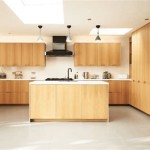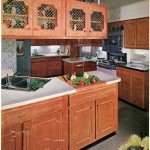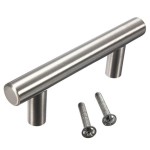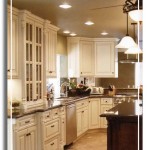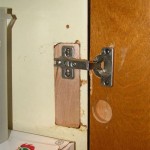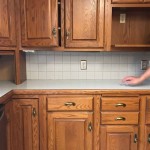Can You Clean Wood Kitchen Cabinets With Vinegar?
Vinegar, a versatile household staple, has gained popularity as a natural cleaning agent due to its antibacterial and acidic properties. Its mild acidity makes it suitable for cleaning various surfaces, including wood kitchen cabinets. However, it's important to approach this task with caution to avoid damaging the delicate finish of your cabinets.
Testing Vinegar on an Inconspicuous Area
Before applying vinegar to your entire cabinet, test it on an inconspicuous area, such as the inside of a lower cabinet door. Apply a small amount of vinegar to a clean cloth and gently wipe the test area. Wait a few minutes and inspect the surface for any discoloration, dulling, or raised grain. If no adverse effects occur, you can proceed with cleaning the rest of the cabinet.
Diluting Vinegar
To minimize the potential for damage to your cabinet's finish, it's crucial to dilute the vinegar. Mix equal parts vinegar and warm water in a spray bottle. Shake well to combine. The diluted vinegar solution will retain its cleaning power without being overly acidic.
Applying the Vinegar Solution
Spray the diluted vinegar solution onto a clean microfiber cloth or sponge. Do not apply the solution directly to the cabinet surface, as this could lead to uneven absorption and potential damage. Wipe the cabinet gently, following the grain direction. Avoid excessive scrubbing or using abrasive materials, as this can scratch the finish.
Drying the Cabinets
After wiping the cabinets with the vinegar solution, it's important to dry them thoroughly. Use a clean, dry microfiber cloth to wipe away any remaining moisture. Ensure that the cabinets are completely dry before using them or closing the doors. Leaving them wet can promote mold or mildew growth.
Neutralizing the Vinegar
While vinegar is generally safe for wood cabinets, its acidic nature can leave behind a lingering odor. To neutralize the vinegar and eliminate any residual acidity, follow these steps:
- Fill a spray bottle with warm water.
- Spray the warm water onto a clean microfiber cloth.
- Wipe down the cabinets again, following the grain direction.
- Dry the cabinets thoroughly with a clean, dry microfiber cloth.
Additional Tips
- Always test vinegar in an inconspicuous area before applying it to the entire cabinet.
- Dilute vinegar in equal parts with warm water.
- Wipe the cabinets gently with a damp cloth, following the grain direction.
- Dry the cabinets thoroughly after cleaning to prevent moisture damage.
- Neutralize the vinegar with warm water to eliminate any lingering odor or acidity.
By following these guidelines, you can safely and effectively clean your wood kitchen cabinets with vinegar. Its antibacterial and acidic properties will help remove dirt, grime, and stains while preserving the delicate finish of your cabinets.

How To Clean Kitchen Cabinets Everyday Skate

3 Ways To Clean Wood Kitchen Cabinets Wikihow Life

How To Clean Wood Kitchen Cabinets Like A Boss Shelfgenie

How To Easily Clean Sticky Wood Kitchen Cabinets Creative Homemaking

Pin By Yuno Marioni Real Estate On Before After Cleaning S Diy Cabinet Cleaner

4 Proven Ways To Clean Sticky Wood Kitchen Cabinets Lovetoknow
How To Clean Sticky Wood Kitchen Cabinets Quora

How To Easily Clean Sticky Wood Kitchen Cabinets Creative Homemaking

How To Clean Wood Cabinets

Why You Should Think Twice Before Using Vinegar To Clean Waxed Wood Cabinets
Related Posts

